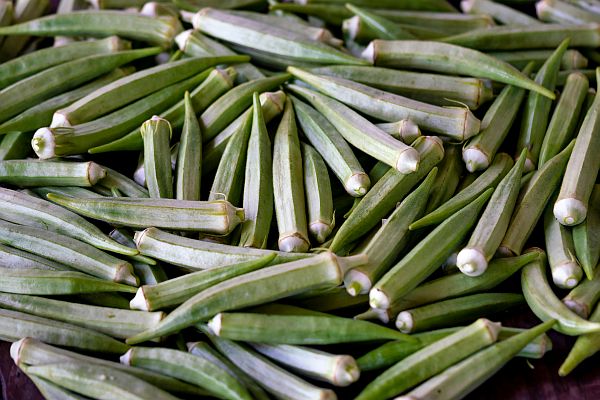Last Updated on May 26, 2025 by Bertrand Clarke
In the ever-evolving world of social media-driven wellness trends, okra water has emerged as TikTok’s newest darling, captivating millions with promises of improved health. From claims of better blood sugar control to enhanced digestion and even weight loss, this murky green drink—made by soaking okra pods in water overnight—has sparked both curiosity and skepticism. But is okra water the miracle elixir TikTokers claim, or is it just another fleeting fad? As the trend gains traction in 2025, experts weigh in, and we dive into the science, cultural roots, and practical considerations behind this slimy sensation.
The TikTok Takeover: Okra Water Goes Viral
TikTok, with its 1.5 billion monthly active users as of early 2025, has become a breeding ground for health trends, from lettuce water for sleep to celery juice cleanses. Okra water, however, has carved out a unique niche. Videos tagged #OkraWater have amassed over 10 million views since January 2025, with influencers showcasing their morning routines featuring glasses of viscous, green-tinted water. Beauty influencer Zareefa, founder of Ammu Beauty Brand, recently shared a viral post claiming that six months of drinking okra water transformed her gut health, garnering 400,000 views on Instagram alone.
The preparation is simple: slice fresh okra pods, soak them in water for 8–12 hours, and drink the resulting liquid, often on an empty stomach. Some add lemon, honey, or spices like cinnamon to mask the drink’s naturally slimy texture, caused by okra’s mucilage—a gel-like substance. TikTokers tout this mucilage as the key to okra water’s purported benefits, claiming it soothes the digestive tract, stabilizes blood sugar, and even promotes glowing skin.
Dr. Karan Rajan, a UK-based surgeon and TikTok health educator with 5 million followers, recently commented on the trend, noting, “Okra water’s mucilage acts like plant lube, potentially aiding gut health by feeding good bacteria.” His video, viewed 2 million times, has fueled the trend’s momentum, but he cautions that the benefits may not be as dramatic as some claim.
The Science Behind the Slime
Okra, also known as “lady’s finger,” is a nutrient-dense vegetable native to Africa and widely cultivated in tropical and subtropical regions. Rich in fiber, vitamins A, C, and K, antioxidants, and minerals like magnesium and folate, okra has long been a staple in cuisines from West African jollof rice to Southern U.S. gumbo. Its health benefits when eaten are well-documented, but the science on okra water is less conclusive.
Blood Sugar Control
One of the most popular claims about okra water is its ability to regulate blood sugar, particularly for those with type 2 diabetes or insulin resistance. A 2023 study published in the Journal of Pharmacy and BioAllied Sciences found that okra’s mucilage may slow glucose absorption in the intestines, reducing post-meal blood sugar spikes. Another small study from 2021 showed that okra capsules improved glycemic control in 60 participants with type 2 diabetes over eight weeks. However, these studies focused on whole okra or extracts, not okra water specifically.
Nutritionist Angela Graham, MBA, RDN, told reporters, “While okra itself is a nutritional powerhouse, the water likely contains only trace amounts of these compounds. It’s not a substitute for diabetes medication or a balanced diet.” As of 2025, no large-scale clinical trials have directly tested okra water’s effects on blood sugar, leaving the claim promising but unproven.
Gut Health and Digestion
Okra’s soluble fiber and mucilage are prebiotics, feeding beneficial gut bacteria and promoting a balanced microbiome. Dr. Rajan explains, “This can help with regular bowel movements and reduce inflammation in the gut.” A 2024 review in Nutrients highlighted okra’s potential to alleviate constipation and support digestive health, but again, the evidence pertains to consuming the vegetable itself.
For okra water, the benefits may be diluted. “The mucilage leaches into the water, but you’re getting a fraction of the fiber and nutrients compared to eating okra,” says Graham. Still, the drink’s hydrating nature could indirectly support digestion, especially for those who struggle to drink plain water.
Weight Loss and Other Claims
TikTokers also claim okra water aids weight loss, citing its fiber and protein content. A 2024 animal study showed that okra extract led to significant weight loss in mice with diabetes, likely due to improved metabolism and reduced fat absorption. However, human studies are lacking, and experts warn against expecting dramatic results from okra water alone.
Other claims, such as improved skin health, immunity, or female sexual health, have even less scientific backing. Geetika Mittal Gupta, a skincare expert, noted in a 2025 Instagram post, “Okra’s vitamins A and C are great for skin, but drinking the water won’t deliver enough to make a noticeable difference.”
Cultural Roots and Modern Revival
While TikTok has popularized okra water, its use predates social media by centuries. In West Africa, okra has been used in traditional medicine to treat digestive issues, inflammation, and even diabetes. In Nigeria, okra soup, rich in mucilage, is a dietary staple believed to support overall health. Similarly, in Ayurvedic practices in India, okra is valued for its cooling properties and digestive benefits.
The modern revival of okra water reflects a broader trend of rediscovering ancestral remedies, repackaged for a digital audience. “It’s not new—it’s just got a new filter,” says Isha Lall, a holistic nutritionist. She notes that combining okra water with honey or spices, as some TikTokers do, echoes traditional preparations that enhance flavor and add health benefits, like honey’s antibacterial properties.
The Risks: Who Should Be Cautious?
Okra water is generally safe for most people, but there are caveats. Okra contains oxalates, which can contribute to kidney stone formation in susceptible individuals. Those with kidney issues should consult a doctor before trying the trend. Additionally, Lall warns that okra’s cooling nature may not suit everyone, particularly those with weak digestion or excess mucus production. “A 2–3 week cycle followed by a break is a good way to test its effects,” she advises.
Another concern is the hype itself. Social media trends often oversimplify complex health issues, leading some to replace proven treatments with unverified remedies. “Okra water isn’t a cure-all,” says Graham. “It’s a low-risk addition to a healthy lifestyle, but don’t expect miracles.”
How to Make Okra Water: Tips for Beginners
For those intrigued by the trend, making okra water is budget-friendly and straightforward. Here’s a basic recipe, with tips to improve palatability:
- Ingredients: 3–4 fresh okra pods, 1 cup of water, optional add-ins (lemon juice, honey, cinnamon, or mint).
- Preparation: Wash okra thoroughly to remove dirt or pesticides. Trim ends and slice pods into small pieces. Soak in water overnight (8–12 hours) at room temperature. Stir and strain the liquid in the morning.
- Serving: Drink on an empty stomach for purported maximum benefits. To reduce sliminess, blend with lemon juice or steep with mint leaves.
Cost-wise, a pound of okra costs about $2–$4 in U.S. grocery stores as of May 2025, making it an affordable wellness hack compared to $50 superfood powders. For those put off by the texture, freezing the okra before soaking can reduce mucilage release, creating a less viscous drink.
The Verdict: Worth the Hype?
Okra water’s rise on TikTok highlights the platform’s power to shape health behaviors, but it also underscores the need for critical thinking. While the drink offers hydration and trace nutrients, its benefits are likely modest compared to eating whole okra. “If you enjoy it, there’s no harm in adding it to your routine,” says Graham. “Just pair it with a balanced diet and realistic expectations.”
As of May 2025, the trend shows no signs of slowing, with new variations like okra water with cloves or ginger gaining traction. Whether okra water becomes a lasting wellness staple or fades like 2024’s lettuce water craze remains to be seen. For now, it’s a low-cost, low-risk way to experiment with a vegetable that’s been nourishing communities for centuries—just don’t expect it to change your life overnight.









